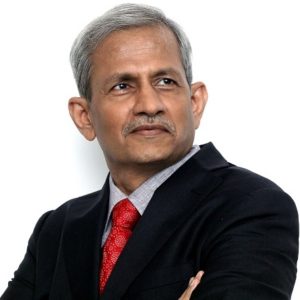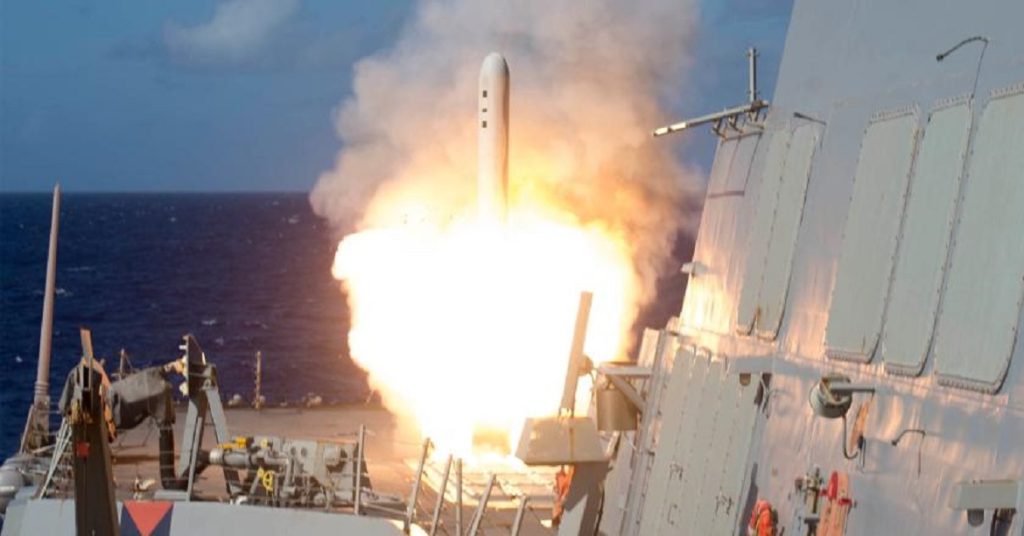World Geostrategic Insights interview with Sundeep Waslekar on the likelihood of war in Ukraine going nuclear, the real prospect of a global nuclear conflict, the indifference of world public opinion to the risk of a nuclear war, and on how to eliminate, or at least reduce, the threat of nuclear catastrophe, even with new and more effective global governance.
 Sundeep Waslekar is President of Strategic Foresight Group, a think-tank based in India that has worked with or on 65 countries from four continents since its inception in 2002. He is also a Senior Research Fellow of the Centre for the Resolution of Intractable Conflicts at Oxford.
Sundeep Waslekar is President of Strategic Foresight Group, a think-tank based in India that has worked with or on 65 countries from four continents since its inception in 2002. He is also a Senior Research Fellow of the Centre for the Resolution of Intractable Conflicts at Oxford.
– At the start of the war in Ukraine, Russian President Vladimir Putin ordered his nation’s nuclear forces to increase vigilance and warned the West that any interference with the invasion would have “consequences you have never experienced in your history.” Suddenly, a previously unthinkable nuclear confrontation became possible. As UN Secretary-General António Guterres said, “the prospect of nuclear conflict…is now back in the realm of possibility.” In your opinion, what is the likelihood of the war in Ukraine going nuclear?
The official Russian position on nuclear weapons is that they will only use them in the case of a nuclear attack on Russia or when the survival of the Russian state is at stake. Since the war in Ukraine is taking place in Ukrainian territory, the question of an existential threat to the Russian state does not arise. It can be therefore argued that Russia has no reason to use nuclear weapons in this war. However, many of the Russian actions have been unpredictable and in breach of the previous agreements. The invasion of Ukraine is in violation of the guarantees provided to Ukraine in return for its renunciation of the nuclear weapons by Russia and other permanent members of the UN Security Council in 1994. In such an unpredictable environment, and especially if NATO gets directly involved in the Ukraine war, we cannot totally rule out Russia’s use of tactical nuclear weapons. The prospect of a nuclear conflict is within the realm of possibility, as articulated by the UN Secretary General.
– There are nearly 13,000 nuclear warheads in the world, 90 percent of them under the command of the United States or Russia. And the world’s nuclear arsenal is set to increase in the next decade, for the first time since the Cold War, as states modernize their weapons stockpiles and refine the role nuclear weapons play in their military strategies. “The risk of nuclear weapons use seems higher now than at any time since the height of the Cold War,” said the director of the Stockholm International Peace Research Institute. We are therefore facing a very worrying trend. But despite the fact that the use of nuclear weapons has become dramatically more likely, world public opinion seems increasingly indifferent to the possibility of the outbreak of nuclear war. Why?
We live in the most dangerous period in the history of our species. More than 2500 nuclear warheads are on the hair trigger alert. There is an increasing reliance on automation and artificial intelligence. During the Covid attack on humanity from 2020 to 2022, large powers such as the United States, Russia and China were busy with the competitive development of hypersonic missiles. These missiles travel at 5 to 30 times the speed of sound, carry a nuclear payload of more than one tonne, plan their own trajectory and cannot be detected by radars. We have partially surrendered the control over nuclear delivery vehicles to machines. The use of artificial intelligence can lead to the manipulation of early warning systems and lead to an accidental nuclear war. It is morally repugnant that machines are to some extent taking control of nuclear warfare from humans. The risk of a global nuclear war by accident, incident or intent is very real.
Despite the growing risk to the survival of human civilization, the global public opinion is numb. It is because humanity has developed a short-sighted and narrow-minded approach to catastrophic risks. We do not recognise the threat of pandemic until a virus attacks millions of people in all countries of the world. We do not recognise the threat of terrorism until a man in the caves in Afghanistan inspires his followers to turn aircrafts into missiles and target the most important trade and defence installations. We may not recognise the nuclear danger until someone actually detonates a bomb, killing millions of people. We see what is on the screen of a computer, ignoring what is there in its central processing unit (CPU). It is absolutely necessary to awaken the global population to the threats to our species’ survival. There is a deficit of moral leaders who can meet this challenge of waking us up from our slumber.
– Nuclear nonproliferation has not worked, India, Pakistan, Israel, and North Korea all have nuclear weapons, and others may follow. Do you think there is still a chance for a new multilateral initiative worldwide to reduce and eventually abolish nuclear weapons, as also required by the Nuclear Non-Proliferation Treaty (NPT), to which all five permanent members of the UN Security Council with nuclear weapons are signatories? Is it still possible to eliminate, or at least significantly reduce, the threat of nuclear catastrophe?
It is absolutely necessary to launch a new multilateral initiative to save the human race from the risk of a global war. It should begin with the five permanent members of the UN Security Council, or the P5. There should be a track two dialogue between security experts from the P5 countries, which should gradually be transformed into an inter-governmental dialogue. It must have three objectives: nuclear risk reduction in the short run, nuclear disarmament and non-proliferation in the long term as per the NPT Articles I and VI, and the establishment of a strong conflict resolution mechanism to resolve conflicts between big powers. Such a paradigm shift is not easy. It will be opposed by the P5 countries. But sometimes it is essential to think of the desirable over what might be possible and organize public opinion in support of the desirable. It is also necessary for one of the P5 states to demonstrate wisdom and use its weight in support of the long term interest of our species without being obsessed with short term interest of the nation state. The United States has an immediate obligation to lead the way since it is the coordinator of the official P5 process on nuclear risk reduction for 2022-2023. If we follow this path, it should be possible to move gradually away from the precipice.
– Humanity has significantly increased its capacity for self-destruction. Besides weapons of mass destruction, what do you think are the other major threats? Can we say that global risks have become extremely dangerous because of the slow and ineffective management of them so far? Do you think the implementation of a new, more effective global governance to address these risks is possible?
In the 12000-years old history of human civilization, existential risks were local or region. It is the first time that they are assuming a civilizational dimension. The Covid-19 was not the last pandemic to threaten the human race. A devastating pandemic can ravage humanity in future. Instead of 600 million infections and six million deaths, a future virus may kill 600-800 million people. Climate crises can lead to unimaginable consequences and erode human civilization over the next few decades. Many scientists ranging from late Stephen Hawking to Nick Bostrom are concerned about artificial intelligence being transformed into superintelligence in the next few decades and taking over the planet. Some other existential risks might surface in the future that we cannot imagine today. The most dangerous existential risk is a global war using nuclear or biological weapons that would put an end to the human race.
We need to reinvent global governance to be able to respond to civilizational risks. The UN Security Council responds to day-to-day conflicts, mostly in the developing world, where the honor and interests of the big powers are not directly involved. It does not have the capacity to end the arms race or prevent wars involving big powers. It does not have the capacity either to prevent or resolve other existential crises including those driven by technology, viruses or climate. We need to establish a Global Governance Grid especially designed to respond to long-term and existential risks of civilizational magnitude. We need to find a way for such a grid to be steered by people of moral authority who think in terms of humanity and not their respective national identities. An institutional change is not enough. We need to change our mindset. We need global citizens with dual loyalty, one to the nation state and the other to human civilization, just as there are dual loyalties to regional entities and nation states. We need a new global social contract. A Global Governance Grid, a new global social contract and global citizenship with dual loyalties may appear Utopian. But we need them as the alternative is the end of human civilization.
ABOUT SUNDEEP WASLEKAR
Sundeep Waslekar is President of Strategic Foresight Group, a think-tank based in India that has worked with or on 65 countries from four continents since its inception in 2002. He is also a Senior Research Fellow of the Centre for the Resolution of Intractable Conflicts at Oxford.
He is a pioneer of Track One and Half Diplomacy, which engages government and parliamentary representatives in a non-binding manner to find solutions in times of crises. He is the creator of the Blue Peace framework for using water as an instrument of peace, which led to the first ever United Security Council session on water, peace and security (UNSC 7818) in UN history.
He has been quoted, reviewed and interviewed in more than 3000 newspapers, websites and television channels in some 70-80 countries. He is the author of a best seller book in his native Marathi language, Eka Dishecha Shodh, with 23 editions. Sundeep read Philosophy, Politics and Economics (PPE) at Oxford University from 1981 to 1983. He was conferred D. Litt. (Honoris Causa) of Symbiosis International University, by the President of India in 2011.







